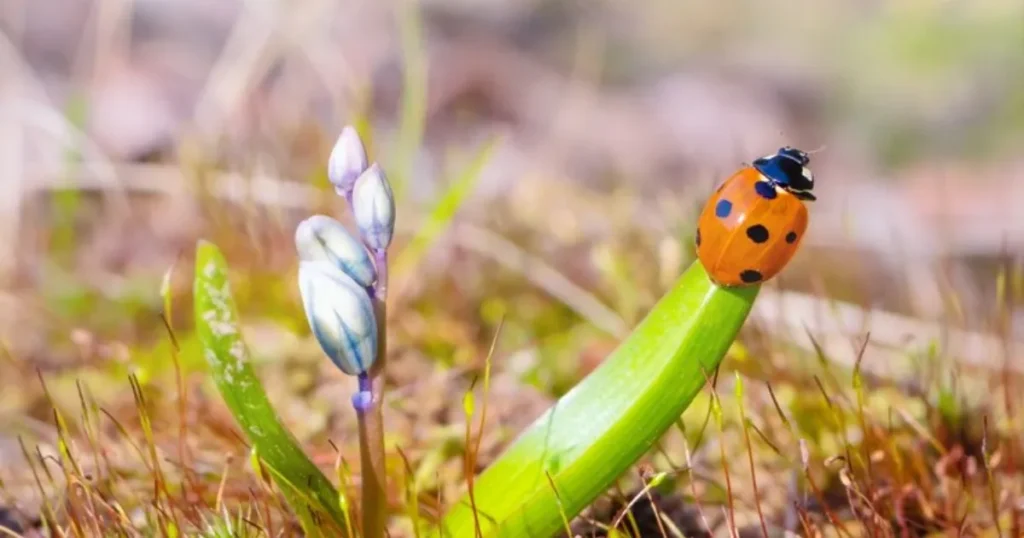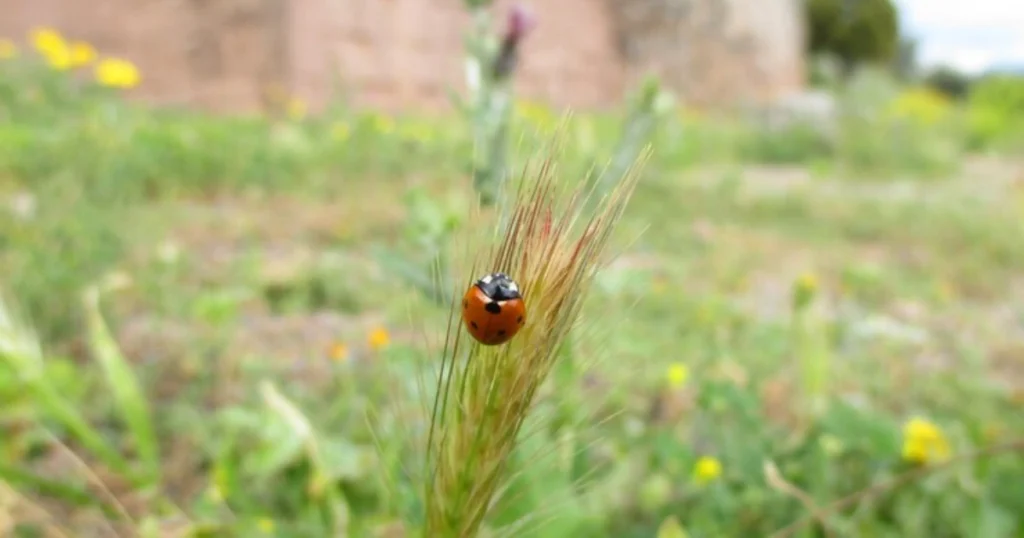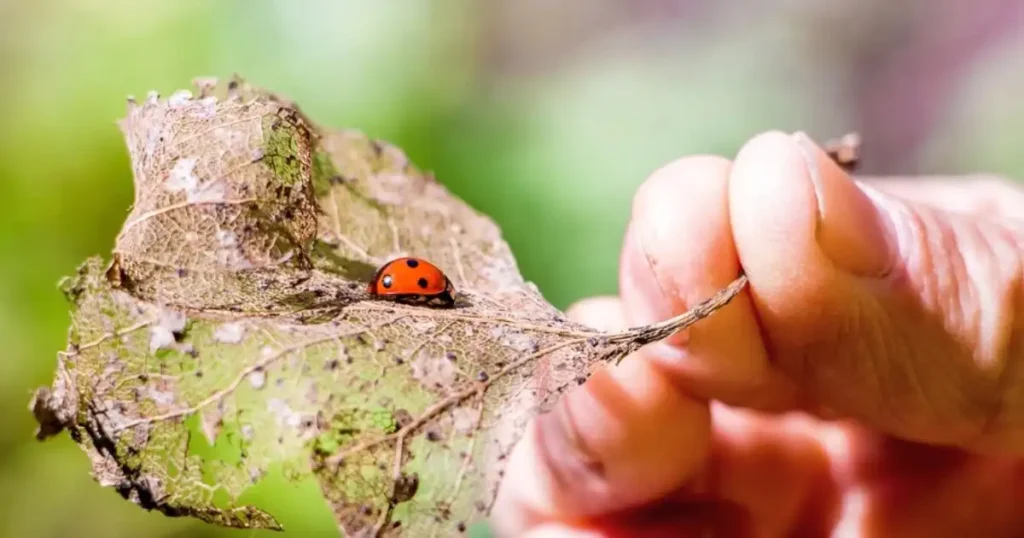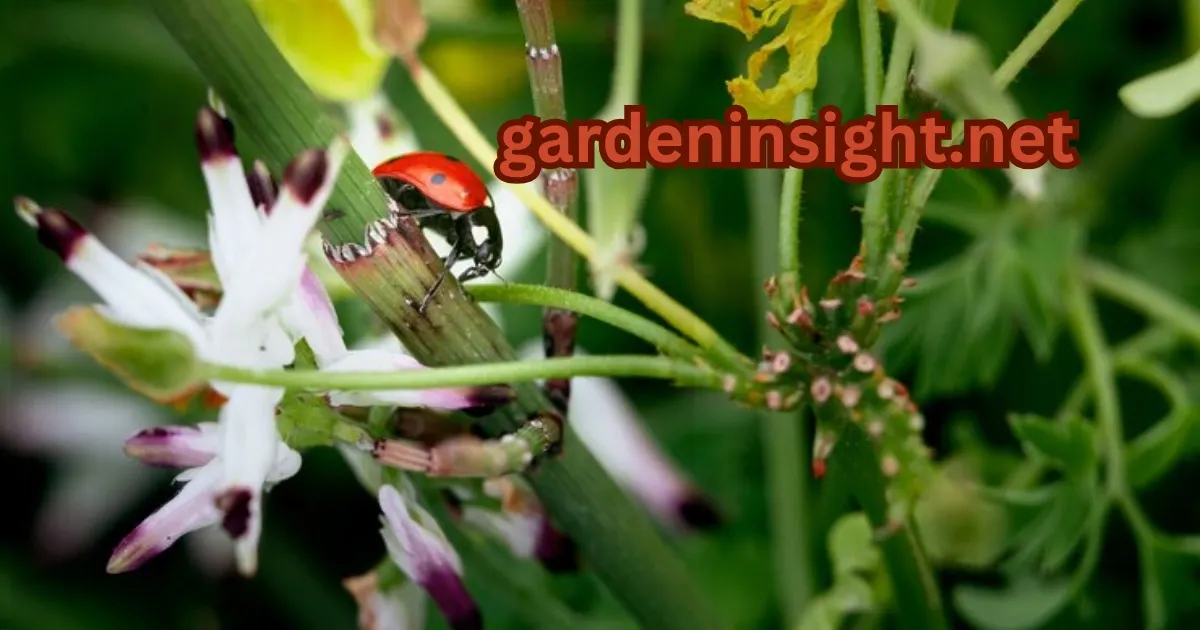Ladybugs, with their vibrant colors and seemingly gentle demeanor, are often a welcome sight in gardens. But are these beloved insects always friends to your plants?
However, not all species are harmless. While most ladybugs are pest controllers, some can pose risks to plants.
This article dives into the complex relationship between ladybugs and plants, helping you understand their role in your garden identify any potential threats and answers to the query “are ladybugs harmful to plants?”.
Do Ladybugs Eat Plants or Just Pests?

This is where things get a bit more complicated. While the majority of ladybugs are beneficial predators, there are a few species that can actually cause damage to plants. These “bad” ladybugs primarily feed on plants instead of insects, and their feeding habits can lead to noticeable damage.
What Types of Ladybugs are Harmful to Plants?
Here are a few examples of ladybugs that can be harmful to your garden:
- Mexican Bean Beetle: This ladybug species is a serious pest of bean plants, feeding on leaves and causing significant damage.
- Squash Beetle: True to its name, this ladybug feeds on squash plants, damaging leaves and fruits.
- Asian Lady Beetle: While this species also consumes pests, it can become a nuisance in large numbers and may even bite humans.
| Ladybug Species | Beneficial/Harmful | Description |
|---|---|---|
| Convergent Lady Beetle | Beneficial | Black markings on orange or red wing covers, common in North America |
| Seven-Spotted Lady Beetle | Beneficial | Red wing covers with seven black spots, common in Europe |
| Asian Lady Beetle | Can be harmful | Variable coloration, often orange or red with multiple spots, can bite |
| Mexican Bean Beetle | Harmful | Orange-brown with black spots, feeds on bean plants |
| Squash Beetle | Harmful | Yellow with black spots, feeds on squash plants |
How Can I Identify Harmful Ladybugs in My Garden?
It’s crucial to be able to distinguish between beneficial and harmful ladybugs. Here’s what to look for:
- Color and markings: Harmful ladybugs often have a duller coloration and may have more spots than beneficial species.
- Feeding habits: Observe whether the ladybugs are feeding on leaves, flowers, or fruits, rather than on insects.
- Plant damage: Look for signs of damage like holes in leaves, chewed flowers, or scarred fruit.
Are Ladybugs Harmful To Vegetable Plants?

Yes, certain ladybug species, like the Mexican Bean Beetle and Squash Beetle, can cause significant damage to vegetable gardens.
It’s important to monitor your vegetable plants for signs of ladybug damage, such as holes in leaves or chewed flowers, and identify the specific ladybug species to determine if control measures are necessary.
Are Asian Lady Beetles Harmful to Plants?
Asian lady beetles are generally considered beneficial because they feed on pests like aphids. However, they can become a nuisance in large numbers and may cause damage to plants by feeding on fruits like grapes. They can also invade homes and release a foul-smelling liquid when disturbed.
Are Ladybugs Bad for Indoor Plants?
Ladybugs are generally not harmful to indoor plants. In fact, they can be helpful in controlling pests that may infest your houseplants. However, if you release ladybugs indoors, be aware that they may fly towards windows and light sources in an attempt to escape.
Are Asian Lady Beetles Harmful to Houseplants?
Similar to their impact on outdoor plants, Asian lady beetles are not typically harmful to houseplants. They may help control pests, but they can become a nuisance if they invade your home in large numbers. It’s best to avoid bringing them indoors intentionally
Are Ladybugs Good or Bad for Flower Gardens?
In most cases, ladybugs are beneficial for flower gardens. They help control pests that can damage flowers and contribute to the overall health of your garden. However, some ladybugs may feed on pollen or nectar, which could potentially affect some flower species.
Do Ladybugs Lay Eggs on Plants?
Yes, ladybugs lay their eggs on plants, usually near a food source like aphids. These eggs hatch into larvae, which also feed on pests. This is another way ladybugs help protect your garden.
Managing Harmful Ladybugs

If you identify harmful ladybugs in your garden, here are some ways to manage them:
- Manual removal: Pick off the ladybugs by hand and dispose of them in soapy water.
- Introduce beneficial insects: Encourage the presence of beneficial ladybugs and other predatory insects that can help control harmful ladybug populations.
- Use insecticides: In severe cases, you may consider using insecticides specifically targeted at the harmful ladybug species. However, use insecticides with caution as they can also harm beneficial insects.
Conclusion
While the presence of ladybugs in your garden is usually a good thing, it’s important to remember that not all ladybugs are beneficial to plants.
By learning about the different types of ladybugs and their feeding habits, you can take steps to protect your garden from potential damage.
Regular monitoring, proper identification, and appropriate management strategies will help you maintain a healthy and thriving garden while enjoying the presence of these fascinating creatures.
FAQs
Some of the frequently inquired queries regarding, “are ladybugs harmful to plants” are as follow:
Are there bad ladybugs that harm plants?
Yes, as mentioned earlier, a few ladybug species primarily feed on plants and can cause damage.
How can I tell if ladybugs are harming my plants?
Look for physical signs of damage on your plants, such as holes in leaves or chewed flowers. Also, observe whether the ladybugs are feeding directly on the plants or on insects.
What types of ladybugs are harmful to plants?
Harmful species include the Mexican bean beetle, squash beetle, and occasionally, the Asian lady beetle.
Can ladybugs damage vegetable gardens?
Yes, certain species can damage vegetable plants, particularly beans and squash.
How do ladybugs affect plant health?
Beneficial ladybugs improve plant health by controlling pests, but harmful species can weaken plants through defoliation.
